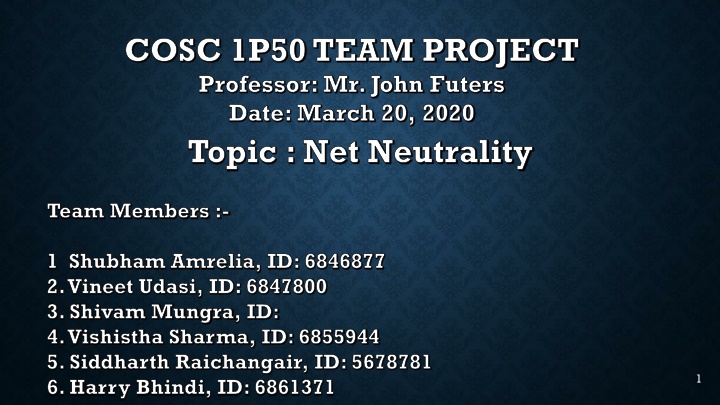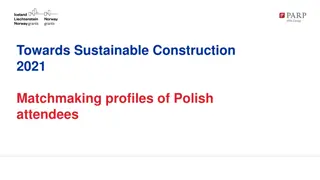
Significance of Net Neutrality in Daily Life
Exploring the concept of net neutrality and its impact on daily internet usage. Learn how net neutrality ensures equal access to online content and services without discrimination from Internet Service Providers.
Download Presentation

Please find below an Image/Link to download the presentation.
The content on the website is provided AS IS for your information and personal use only. It may not be sold, licensed, or shared on other websites without obtaining consent from the author. If you encounter any issues during the download, it is possible that the publisher has removed the file from their server.
You are allowed to download the files provided on this website for personal or commercial use, subject to the condition that they are used lawfully. All files are the property of their respective owners.
The content on the website is provided AS IS for your information and personal use only. It may not be sold, licensed, or shared on other websites without obtaining consent from the author.
E N D
Presentation Transcript
COSC 1P50 TEAM PROJECT Professor: Mr. John Futers Date: March 20, 2020 Topic : Net Neutrality Team Members :- 1 Shubham Amrelia, ID: 6846877 2. Vineet Udasi, ID: 6847800 3. Shivam Mungra, ID: 4. Vishistha Sharma, ID: 6855944 5. Siddharth Raichangair, ID: 5678781 6. Harry Bhindi, ID: 6861371 1
Leader: Shubham N. Amrelia Researcher: Vinit Udaasi, Shubham Amrelia Writer: Shivam Mungra, Vishishtha Sharma Editor: Harry Bhindi, Siddharth Raichangair Secretary/Recorders: Vinit Udaasi & Shivam Mungra 2
Net Neutrality Net neutrality is the principle which states that all platforms, which can access internet, should be treated equally and without any discrimination. 3
Network neutrality,or literally net neutrality,is the idea that Internet service providers(ISPs) shall handle all Internet communications similarly,do not restrict or bill differently on the grounds of customer,informat ion,domain,device,programme,hardware size, source address,destination address or contact system. A professor of media law, Tim Wu, from University of Columbia coined this term for the first time in 2003. It is sometimes also called commoncarrier . 4
With network neutrality in effect, the ISPs dont intentionally block the services, content, or charge more for a specific content. However, without net neutrality, ISPs can prioritise some traffic types, metre other types, or theoretically block traffic from other services, and charging customers for various service rates. Net neutrality does not restrict all the resources that ISPs have to use to control the content of the users. 5
NET NEUTRALITY IN DAILY LIFE. Many questions would pop up in the mind when we use the term Network Neutrality. We understood the meaning of net neutrality theoretically but what do we mean by it in daily life? Does it have anything to do with us using the internet? All these questions do deal with usage of anything on the internet. Answers to such FAQs can be found ahead, in the next slide. 6
ALL THOSE QUESTIONS HAVE ONLY ONE ANSWER, NET NEUTRALITY IS THE ONLY THING THAT HAS APPROVED OUR ACCESS TO SOCIAL MEDIA AND EVERY FACILITY THAT WE ARE ABLE TO USE PRESENTLY. IN OTHER WORDS, NET NEUTRALITY IS THE SOLE REASON INTERNET HAS BEEN AVAILABLE TO SO MANY PEOPLE FOR FREE. 7
We have enough information about net neutrality at the moment to move forward and learn more about it. The following slides will be focusing primarily on the principles of net neutrality and the ways by which it is implemented. Furthermore, we will discuss the issues that are encountered while implementing this aspect. Do you know what is the best joke about net neutrality, not everyone gets it. 8
PRINCIPLES Open Internet :- Open Internet means any individual or organization can easily access and operate the full resources of the Internet. In contrast, the restrictions on some web services or websites by the government or some corporations is referred to as Closed Internet . Dumb Pipe :- A dumb network behaves like water pipes in the apartment providing stable internet to all but without knowing the identity of the users activities. It means there is less or no management of its use patterns, and hence protects privacy. 9
Traffic shaping :- The management of traffic in computer networks to maximize or provide reliable performance, either by improving latency or by increasing bandwidth. Device Neutrality :- It means that all the people are free to install applications of their choice and are also free to remove it whenever they want to. End-to-end principle :- According to it, functions or operations related communication protocol should occur at the communication system s end points. 10
Invoicing and tariffs :- To provide sharing equality and wise use, ISPs put an upper monthly threshold on the usage of the data. Alternative Networks :- There are options available like public WiFi or Google Loon which can take traffic away from network providers. Over provisioning :- Over-provisioning is basically assigning more bandwidth in networking and obtaining good quality of service (QoS). 11
ISSUES Discrimination by protocol :- Discrimination of protocol is the preferring or blocking of data dependent on parts of the communications protocol that the PCs are utilizing to convey. Discrimination by IP address :- Utilizing profound parcel review so as to filter information, it was at first utilized against destructive malware and these days for Internet restriction. It includes making constant segregation between various sorts of information and are utilized for administrations, for example, Google Mail or Facebook. 12
Peering Discrimination :- Plans between various Internet Service Providers that choose to improve the nature of the administration for their customers. Favoring fast-loading websites :- It may mediate with unhindered internet as it was demonstrated that numerous clients want to close the site or tab that is delayed to load or doesn't download whole content quickly. Favoring private networks :- Defenders of unhindered internet contend that without new guidelines, ISP s would have the option to benefit from and favor their own private conventions over others. 13
DEVELOPMENTS IN IMPLEMENTING NET NEUTRALITY(COUNTRY WISE). We will mainly discuss about two countries, Canada and the United States. So far, Only two countries have been implementing laws against this aspect. The idea of net neutrality has not been the most popular in many countries and as it stands, very few countries consider this seriously. There are countries that still are not aware of this problem and who even do not have access to the internet. 14
Developments in Canada. The Canadian government has some strict laws to protect net neutrality. The Canadian Radio-television and Telecommunications Commission (CRTC or The Commission) defines net neutrality as the general principle that all traffic on the Internet should be given equal treatment by Internet service providers (ISPs). The Commission s net neutrality policy specifically rests on sections 27(2) and 36 of the Telecommunications Act (the Act): 27(2) No Canadian carrier shall, in relation to the provision of a telecommunications service or the charging of a rate for it, unjustly discriminate or give an undue or unreasonable preference toward any person, including itself, or subject any person to an undue or unreasonable disadvantage. 36 Except where the Commission approves otherwise, a Canadian carrier shall not control the content or influence the meaning or purpose of telecommunications carried by it for the public. Net neutrality attracted much attention last year after the Chairman of the U.S. Federal Communications Commission (FCC) announced plans to roll back American net-neutrality regulations. 15
DEVELOPMENTS IN THE UNITED STATES. 2005 o 2006 o 2007 o o 2008 o o o 2010 o FFC statement supporting net neutrality. Senate committee approves Telecommunication reform act but fails to pass both houses. FTC urges restraint against net neutrality. Comcast caught blocking or delaying BitTorrent uploads. FCC's Kevin Martin wants to prevent broadband ISPs from interfering with access. FFC rules Comcast slows down some users video files. Time Warner proposes "consumption based billing . FCC drops efforts to enforce Net Neutrality. 16
MYTH:- NET NEUTRALITY IS THE SOLUTION TO EVERYTHING. 17
SOME IMPORTANT AND NOTABLE APPLICATIONS AND IMPLEMENTATIONS Talking about the applications of net neutrality, there are many implementations made. But, here we will shed light on the most relevant ones. Firstly, sites like Wikipedia, Quora, etc., that are a great source of information are free only due to net neutrality. Otherwise, it would be payable. Secondly, important apps like Facebook, Twitter, Whatsapp, Instagram, etc., through which news and information spreads in a second are free to use by everyone just due to net neutrality. 18
WHY SHOULD WE CARE???? Well, this question takes us back to our rights. The rights that we have as a citizen on the internet are equally important as the rights we have in our day to day life The three main aspects which we take into consideration are: 1. Freedom. 2. Equality. 3. Responsibility. 19
DEBUNKING MYTHS Myth: Net Neutrality is a solution in search of a problem. Reality: ISPs claim that Net Neutrality is a solution in searchof a problem, but they also say they need to violate theprinciples of the open Internet to reap profits from newdiscriminatory business models. Now the technology that enablesdiscrimination is finally available to ISPs. Myth: This will be the first time the government has regulated the Internet. Reality: The open Internet as we know it would not exist if not for regulation. More than 40 years ago, the FCC helped to create an environment where the Internet could flourish by preventing phone companies from interfering with traffic flowing over their networks. Myth: Net Neutrality rules will discourage investment. Reality: Without Net Neutrality, ISPs will actually have an incentive to delay investment and profit by selling access at a premium to artificially scarce bandwidth. Myth: Net Neutrality would prevent ISPs from effectively managing Web congestion from video streaming and other bandwidth-intensive activities that are clogging up the Web. Reality: Nothing in the proposed FCC open Internet rules, or in congressional legislation, would prevent an ISP from using reasonable network management techniques to deal with congestion. Net Neutrality rules will preserve the free flow of information, spur investment and promote choice, Turner said. We cannot allow the future of the open Internet to be sabotaged by these long-discredited myths. 20
REFERENCES(BIBLIOGRAPHY). 1.The Pacific Telegraph Act (1860) http://cprr.org/Museum/Pacific_Telegraph_Act_1860.html 2.Network Neutrality http://en.wikipedia.org/wiki/Network_neutrality 3.Network neutrality in the United States http://en.wikipedia.org/wiki/Network_neutrality_in_the_United_States 4.Free Press http://www.freepress.net 5.SaveTheInternet.com http://www.SaveTheInternet.com 6.Wikipedia(partly). 7.HillNotes(Library of parliament). https://hillnotes.ca/2018/09/20/net-neutrality- in-canada/ 21
This project has been made possible by the time and amount of work that each member has spent finding, filtering, arranging, compiling and editing the information and adding their own ideas in it. I sincerely thank every member of this group for sticking together and making this work possible, and that too by maintaining the relevancy and the quality of it. Without you all being active, responsive and constantly working, this wouldn t have been possible. - Shubham Amrelia, Leader. We sincerely appreciate the time, attention and patience you have used to look at our presentation. We hope you will rate this presentation according to the time and efforts we ve invested to make this well defined and well maintained presentation. - TEAM. 22
The End 23


